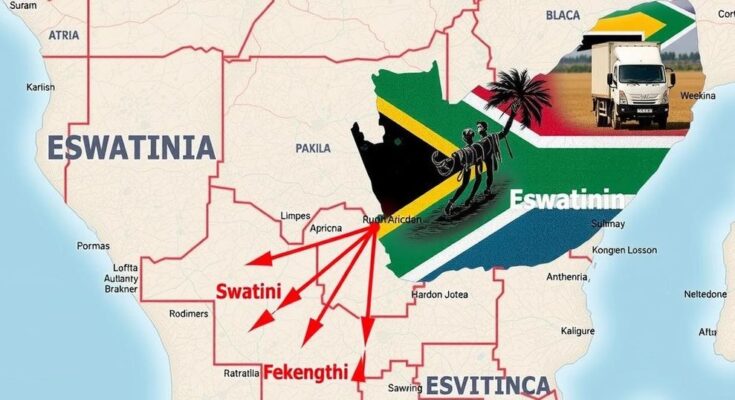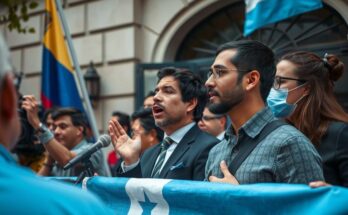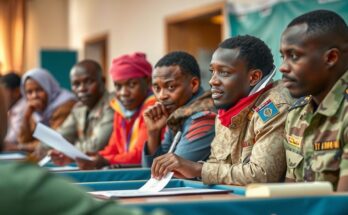Mozambique is currently facing a political crisis following a disputed election, resulting in violent protests that have affected trade and travel with South Africa. In response, authorities have redirected traffic to Eswatini’s Mananga Border Post. Regional analysts express cautious optimism about the potential for dialogue to stabilize the situation, with calls for international support and intervention from bodies like SADC.
As Mozambique encounters a political crisis characterized by violent protests and a disputed election, the situation along its southern border with South Africa has become increasingly precarious, leading to a significant disruption in trade and travel. In response to the unrest, authorities have redirected the flow of goods and travelers from South Africa’s Leebombo Border Post to Eswatini’s Mananga Border Post, which has emerged as a crucial alternative route for passage into and out of Mozambique.
Michael Masiapato, the commissioner of South Africa’s Border Management Authority, reported to Voice of America (VOA) that while authorities are attempting to manage the evolving crisis, it still presents notable difficulties. He remarked, “Even … when they deploy the military and when they deploy police officers on the corridor [between the capital, Maputo, and the border], it is not able to cover each and every area.” According to him, the protests are characterized as “very much sporadic” and “very much widespread.”
The unrest escalated after the controversial victory of presidential candidate Daniel Chapo in Monday’s election, which has resulted in numerous fatalities amid the continuing violence. Political analysts have voiced concerns that ongoing instability could undermine regional security, hinder economic development, and potentially lead to increased criminal activities and weapons proliferation.
Solomon Mondlane, a political analyst in Mozambique, expressed cautious optimism regarding the international community’s efforts to foster dialogue in the region. “The situation is volatile,” Mondlane stated. “The good news is we’re hearing more calls from different countries — from South Africa, from other European countries — calling for more dialogue. South Africa has come out to say they are willing to facilitate a dialogue. “We know that South Africa’s ANC-led government has been in support of Frelimo, the ruling political party; they were the first to congratulate Frelimo for winning these rigged elections. But we are happy that they are adhering to the calls now to say we are willing to facilitate dialogue between the opposition in Mozambique and the ruling party.”
Levy Ndou, a political analyst and lecturer at Tshwane University of Technology in Johannesburg, emphasized the importance of regional actors seeking peaceful resolution, stating, “Of course, if the situation gets out of hand, it will therefore require the intervention of SADC in order to ensure that there is peace, there is stability and, indeed, there is economic activity that is going on.” Zimbabwean President Emmerson Mnangagwa, who is the chair of the Southern African Development Community (SADC), has indicated that the regional bloc is prepared to support Mozambique in these challenging times.
The current events in Mozambique stem from a political crisis that erupted following a contentious national election, where the outcome has been widely disputed. This has resulted in violent protests and raised concerns about political violence leading to broader regional instability. The situation has forced significant changes in trade and travel routes, highlighting the interplay between political conditions and economic activities in bordering nations. The involvement of regional organizations like SADC reflects the collaborative effort needed to manage the crisis and ensure stability, which is crucial for economic growth in the region.
The evolving political crisis in Mozambique presents significant challenges not only for the nation itself but also for the surrounding regions, particularly with regard to trade and travel. With trade routes being redirected to Eswatini amid increasing violence, regional stakeholders are called upon to engage in dialogue and seek a peaceful resolution. The international community’s willingness to facilitate discussions highlights the collective responsibility towards ensuring stability and fostering economic development in Mozambique and its neighboring countries.
Original Source: www.voazimbabwe.com




